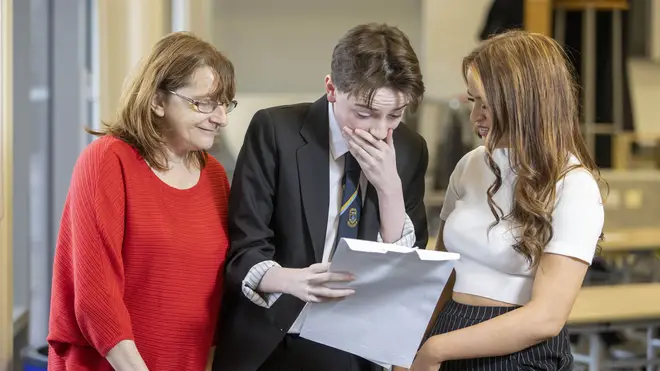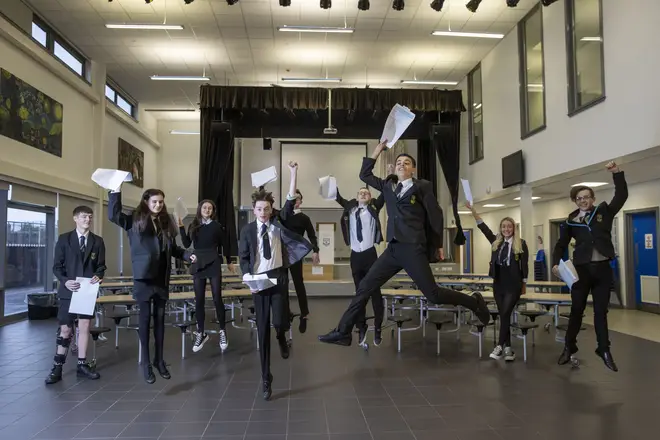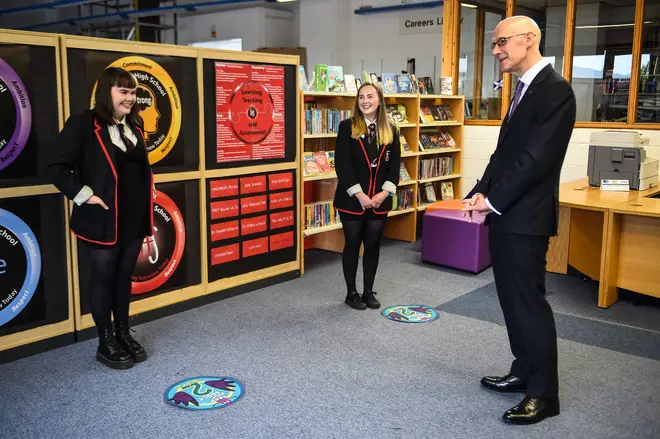
Lewis Goodall 10am - 12pm
5 August 2020, 17:59

Exam boards are bracing for 125,000 appeals amid an angry row over Scottish pupils being marked down due to coronavirus, threatening further chaos on GCSE and A-level results day.
Around a quarter of students in Scotland received lower grades than expected for National4, National5, Highers and Advanced Highers, prompting outcry.
Teachers set predicted grades for pupils this year, based on prior assessments, after all exams were cancelled when schools shut in March.
But the Scottish Qualifications Authority (SQA) stepped in to change around 133,000 grades to align with the average of previous years.
In 93.1 per cent of cases, the teachers’ estimate was lowered. Deprived areas were hit hardest, with 15 percentage points cut.
Experts and lawyers told LBC News thousands of pupils are set to appeal, with many claiming they have been penalised for over-performance.
Lewis Nixon said that in his mock exams, known as prelims, he scored 95% in PE, a C in computing and an A in English. Yet on Tuesday his National5 results were lowered to a B, D and B “for no given reason”.

He is now appealing, and told LBC News: “My marks could effect what classes I’m in next year and could mean I have to re-sit in the case of computing.
“Almost everyone I’ve spoken to says they are appealing their results as well, but I’m not really sure how the appealing process works.
“I’ve contacted the school, and they say they’re handling the situation as best as they can.”
Eva, another student, had her suite of predicted Highers grades lowered from AACBA to BBDFB and has now written to John Swinney, the Scottish education secretary, demanding that the “nothing but discriminatory” emergency marking system be “urgently investigated”.
READ MORE: Thousands of grades cut down on Scotland results day

Children's Commissioner demands kids are prioritised
“It is clear to me that my grades have been significantly adjusted because I go to a school which is classed as underperforming,” she said. “To have my grades knocked down so significantly has not only made me have to completely reconsider my career path but has also made me lose confidence in myself.”
Lindsay Paterson, professor of education policy at Edinburgh University, told LBC News: “It is very likely that there will be many more appeals than usual. The rules are that an appeal can be made in a subject only if the teachers’ estimated grade for the student in that subject was higher than the grade awarded this week.
“There are about 125,000 such cases, ten times the normal number of appeals. I would urge all students (and their parents) to put pressure on schools to appeal in these circumstances.”
He said a “constraint towards consistency” in SQA’s moderation process means “many students in schools serving deprived areas have had their grades pulled down”, especially the “outstanding student”.

First Minister Nicola Sturgeon intervened to defend the SQA on Wednesday, insisting the pass rate had teachers’ grades not been cut would have been “unprecedented and therefore not credible”.
The growing furore over Scotland’s results has raised concerns of a barrage of complaints from pupils and parents on A-level results day, on 13 August, and GCSE results day on 20 August.
Helen Tucker, a partner at the education law firm Stone King said: “Schools will need to be ready to respond to questions students have in relation to grades and I expect there will be a number of students who are disappointed.”
But she warned guidance from Ofqual, the exams regulator in England and Wales, creates a “very limited scope” for grade appeals. Like in Scotland, GCSE and A-level students cannot appeal individually but instead must go through their school. Fees for the process have been dropped this year.

“It’s limited to very specific issues,” she said. “For example a school could appeal on behalf of a student on basis they made a mistake, for example submitting the wrong data, but they couldn’t do it because [an examiners’] judgement was wrong, and a pupil can’t appeal on the basis the school got it wrong when they assessed their grade.”
Former headteacher Geoff Barton, general secretary of the Association of School and College Leaders, told LBC News it was “very likely” some GCSE and A-level grades will be reduced by examiners.
“Despite the best efforts of everybody involved, there was always likely to be some mismatch… because this system had to be developed at great speed and from scratch in response to unprecedented circumstances."
He added: “We would advise any student who is unhappy with their results to talk to their teachers, who will be able to explain the process, offer support and advise on any next steps they may wish to take.”
The SQA said priority in appeals would be given to those awaiting a college or university place.
A spokesman added: “We believe we have delivered fairness to learners, through a consistent, evidence-based approach in the absence of exams."